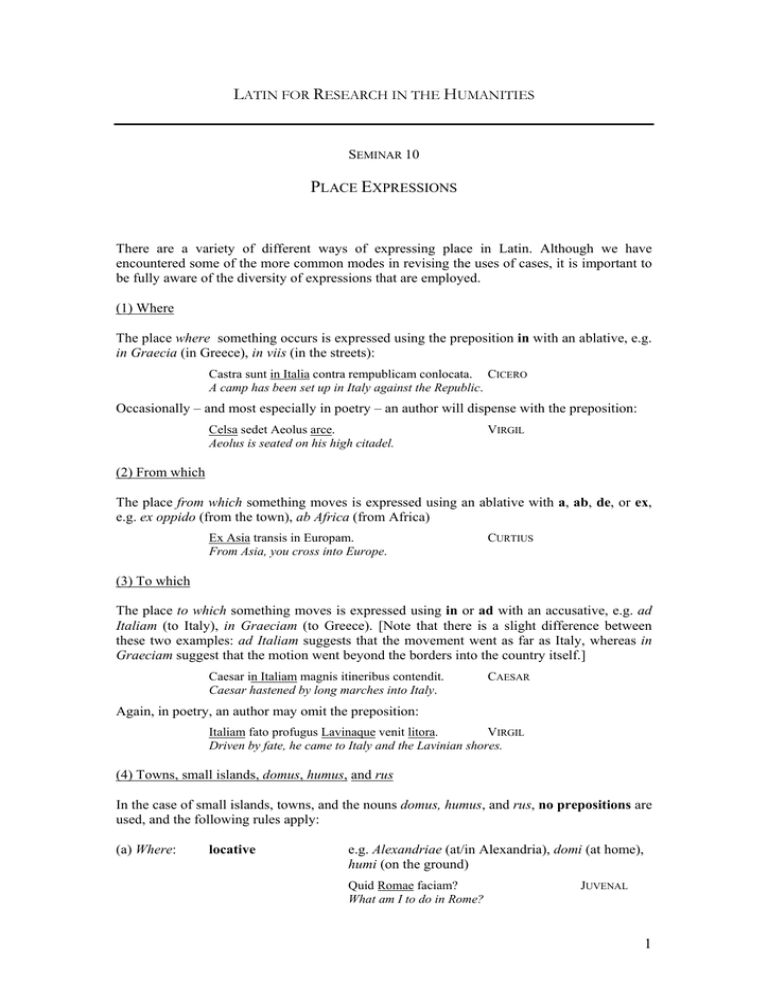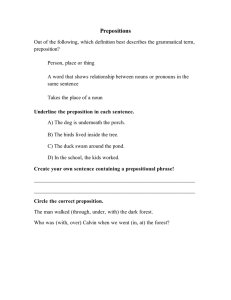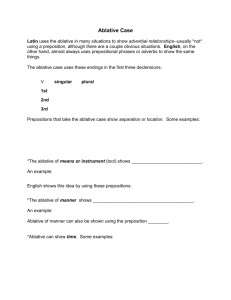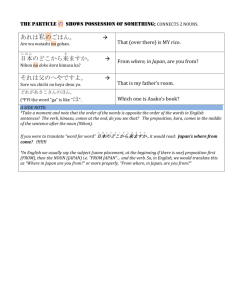L R H
advertisement

LATIN FOR RESEARCH IN THE HUMANITIES SEMINAR 10 PLACE EXPRESSIONS There are a variety of different ways of expressing place in Latin. Although we have encountered some of the more common modes in revising the uses of cases, it is important to be fully aware of the diversity of expressions that are employed. (1) Where The place where something occurs is expressed using the preposition in with an ablative, e.g. in Graecia (in Greece), in viis (in the streets): Castra sunt in Italia contra rempublicam conlocata. CICERO A camp has been set up in Italy against the Republic. Occasionally – and most especially in poetry – an author will dispense with the preposition: Celsa sedet Aeolus arce. Aeolus is seated on his high citadel. VIRGIL (2) From which The place from which something moves is expressed using an ablative with a, ab, de, or ex, e.g. ex oppido (from the town), ab Africa (from Africa) Ex Asia transis in Europam. From Asia, you cross into Europe. CURTIUS (3) To which The place to which something moves is expressed using in or ad with an accusative, e.g. ad Italiam (to Italy), in Graeciam (to Greece). [Note that there is a slight difference between these two examples: ad Italiam suggests that the movement went as far as Italy, whereas in Graeciam suggest that the motion went beyond the borders into the country itself.] Caesar in Italiam magnis itineribus contendit. Caesar hastened by long marches into Italy. CAESAR Again, in poetry, an author may omit the preposition: Italiam fato profugus Lavinaque venit litora. VIRGIL Driven by fate, he came to Italy and the Lavinian shores. (4) Towns, small islands, domus, humus, and rus In the case of small islands, towns, and the nouns domus, humus, and rus, no prepositions are used, and the following rules apply: (a) Where: locative e.g. Alexandriae (at/in Alexandria), domi (at home), humi (on the ground) Quid Romae faciam? What am I to do in Rome? JUVENAL 1 (b) From: e.g. Roma (from Rome), rure (from the countryside) ablative CICERO Demaratus fugit Tarquinios Corintho. Demaratus fled from Corinth to Tarquinii. (c) To: e.g. Pompeios (to Pompeii), domum (homewards) accusative Regulus Carthaginem rediit. Regulus returned to Carthage. CICERO (5) Exceptions • • No preposition is used in expressions indicating the place where something happens if the expression includes the noun locus (hoc loco, isdem locis), or the adjectives totus and medius (tota urbe). The road by which one travels is treated as an instrument, and thus has no preposition. (6) Adverbs of place Some of the most common adverbs of place include the following: hic ibi ubi ubique here there where everywhere huc eo quo to here to there to where eodem to the same place hinc inde unde undique from here from there from where from everywhere Exercises (1) Nemo in foro erat; nam omnes cives ad amphitheatrum festinabant. (2) Mercatores, ex Italia profecti, in Sicilia duos menses manserunt. (3) Pater tuus heri rure abiit, ut pompam Romae spectaret. (4) Hodie domi laboro; cras tamen iter Athenas faciam. (5) Nuntii prima luce Pompeiis discesserunt et Romam contenderunt. (6) Centurio, Devae in pugna vulneratus, in Galliam redire temptavit; Londinii autem mortuus est. q. 6 – Devae = in/at Chester 2







